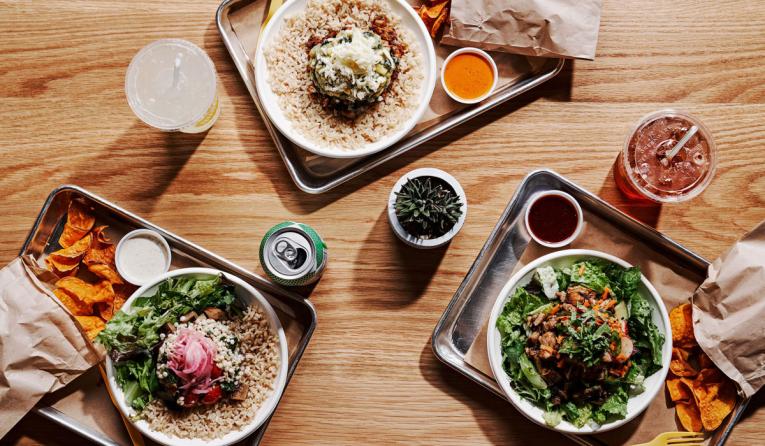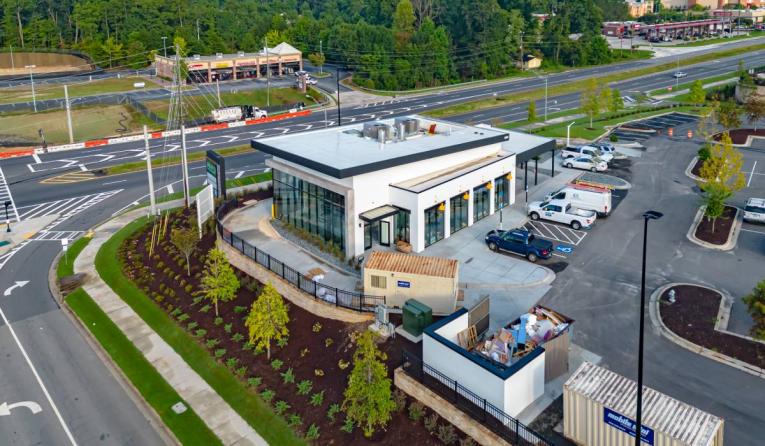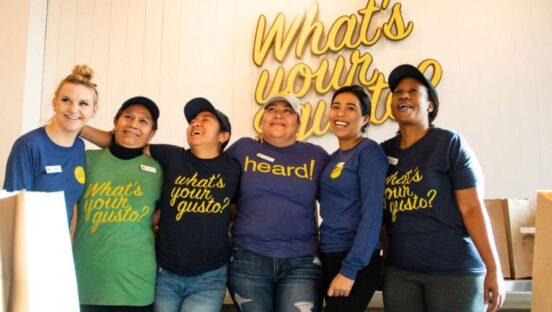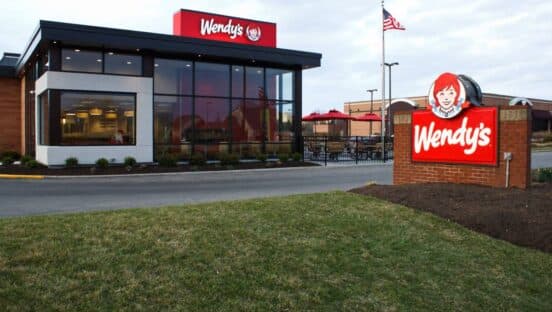Nate Hybl was driving around Atlanta in a busted minivan with pots, pans, and a grill, trying to raise money. He’s the first to admit he was all vision and no playbook at the time. The former Oklahoma Sooners quarterback, who spent time with a couple of NFL teams, imagined a product he wanted as a consumer—something he felt Atlanta’s dining scene sorely lacked: fresh and healthy food, offered quick at an accessible price. In this case, served in customizable bowls and wraps topped with grilled proteins. While that mission sounds prevailing these days, it was hardly the case in 2014, especially in the Southeast’s largest metro.
It would take more than three years to collect capital and get gusto! going. The brand found its footing and developed into a “young, fiery” fast casual on the rise, Hybl says. But there is one thing that fooled him, all these years later.
Hybl’s first investor pitchbook included a quote from self-help guide guru Dale Carnegie. “Today is life—the only life you are sure of. Make the most of today. Get interested in something. Shake yourself awake … let the winds of enthusiasm sweep through you. Live today with gusto.”
The adage, which is in every store (there’s even a painted portrait of Carnegie in the company’s office), inspired gusto!’s foundation and its tagline—customers ask guests, “What’s your gusto?” before they pick a greens or grains bowl or flatbread. Over the years, as gusto! reached 12 locations, powered through the pandemic stall, and came out ready to grow again, Hybl’s job evolved from every hat to overseeing the one angle that most often leads to brand drift, he says. In the next three years, gusto! wants to double its footprint (all corporate) and Hybl says his A1 task will be to internally build “really strong cultural tenets.”
“Because,” he says, “it’s almost inevitable that should start slipping away the bigger you get. And so, I feel it’s my No. 1 job to remember who we are and keep us connected.”
In that directive is the lasting lesson, Hybl explains. As much as gusto! was a brand designed to fill a gap in Atlanta’s culinary market, it wasn’t the differentiator he’s scaled a business on. “The product means high-quality healthy food, and fast,” he says. “Which you can see why that unique value proposition fooled me into thinking it was the thing. The thing is our human beings. I think people talk about it all the time: ‘Hey, we’re a human-being company; we’re in the human-being business.’ Bullshit. Most of them don’t put their money where their mouth is.”
Hybl threw for nearly 5,000 yards as a Sooner, won two bowl games, and was the 2003 Rose Bowl MVP. So it’s not a stretch to say he understands the team dynamic on a deeper level than most. But it’s not really why he got into restaurants. That gravity arrived later. “We have an opportunity that’s much bigger than the food. It’s much bigger than community. It’s an impact on thousands and thousands of peoples’ lives, personally and professionally,” Hybl says. “And we are crafting intentional cultural lines in the sand that we intend to hold every single human being as accountable as possible do.”
Hybl calls it “the human P&L.” Any operator at this level can decipher a statement, wiggle costs, and massage G&A. “But the best brands in the world and the ones that I’ve been reading about on Week 1 that I aspire and chase to be, to have some way of measuring their human beings, their teammates growth,” he says, citing Delta, Home Depot, and Chick-fil-A as companies he’s strived to emulate.
In the thick of COVID, gusto!’s company-wide employee turnover rate was 108 percent, about 29 percent lower than the average limited-service brand, and well below some larger fast casuals. How Hybl cultivated this boiled down to four anchors—optimal work environment through purpose-driven culture; promoting work/life balance; creating opportunity for development; and competitive hourly pay and strong benefits.

“I tell people, ‘we’re constantly under construction,'” Hybl says.
One thing gusto! does is offer PTO for all employees in a shift leader position and above. Shift leaders receive five days per year, managers seven, assistant operators 10, and local operating partners 15. In regard to the latter role, there’s a designated path for every employee to become an operating partner if they so choose to chase it. Shift leaders and managers are eligible for health benefits after 60 days and all other employees can sign up a year in.
Dan Jones, in one example of gusto!’s potential track, started as a catering assistant in 2017 before being promoted to assistant catering manager, assistant operator, and, ultimately, local operating partner at gusto!’s original store. Operating partners participate in profit sharing and garner 15 percent of net profits for their location, a model similar to Texas Roadhouse and others. Dressed down, it’s a chance to run their own business without investing personal capital. gusto! leadership during COVID created a pandemic stipend for operating partners to help make up for lost profits and earnings.
In 2022, employees were earning $15–$16 per hour with tips included. Each employee receives free meals on work days (Hybl says this amounts to $2,600 worth of meals per year).
There are some more holistic approaches, too. gusto! rethinks employee reviews as “Heard Sessions.” Instead of dishing out critical feedback, managers sit back and listen. These served as check-ins amid COVID, going beyond evaluating performance to creating open dialogue to chat about growth potential, likes and dislikes, and anything leadership could do to improve life within restaurants. They’ve provided effective outlets over the years for gusto! to grow its organization organically and identify talent.
“There’s a reason why a lot of founders don’t end up running a company,” Hybl says. “It’s different skillsets. I tell people, ‘we’re constantly under construction.’ There’s very little relief. It never stops if you’re high growth and aggressive with what you want to achieve.”
Like Hybl’s original months on the line, he’s still enduring CEO crash courses. Of late, he’s leaned into professional coaching. “You don’t know what you don’t know,” Hybl says.
“I thought I was pretty self-aware,” he adds. “I thought I was pretty compassionate. And you get into professional coaching, and they give you these results and they’re like, you’re in the 99th percentile of being a control freak. You’re in the 99th percentile of being a perfectionist. You’re in the 99th percentile of being hyper critical. And so, after our first couple rounds of coaching, I came back to our leadership team and I said, ‘I’m sorry.’”
The key, he adds, namely in this industry, is to become less reactive as a leader.
One tip: every morning, Hybl takes a Sharpie and writes a pause button on his hand. “I go into rooms now saying, ‘how little can I talk?” Hybl says.
Today, it’s a matter of understanding the webs of organizational leadership. Structure is not one of Hybl’s strengths, for instance. He’s a big-picture guy who’s focused on getting the right people in the right seats to develop a brand that’s sturdy and repeatable. Once, in a phone conversation with Danny Meyer, Hybl told the hospitality maven he has a dream of gusto! becoming “an incredible communications company.”
“I think he looked at me like I was crazy, but at the end of the day, from the top all the way down to sideways, left, right, diagonal, it’s a massive game of telephone,” Hybl says. “And there’s nothing but red and yellow lights along the way. So this probably applies to any organization and I’m learning every step of the way, but trying to turn those red and yellow lights into green lights, and us being connected and saying the same things and moving the same ways and help each other succeed, is going to make all the difference.”

Growth and the road forward
Before COVID, Hybl says, gusto! was “winning” and had tailwinds propelling it across the Peach State. It kept growing over the next couple of years, but, unsurprisingly, faced a slog from 2022 onward. Hybl considers Q1 2023 the real “life after” in terms of revealing what the pandemic’s wake looks like. gusto! had a strong period for the first time in nearly three years. “So morale is being boosted and accountability is starting to return,” he says. “I don’t think that’s talked about a lot. It’s hard to be really strict and accountable when you’re just happy people are showing up at work at all.”
Hybl says gusto! spent its pandemic-induced stall strengthening the brand. It was 12 months of shoring up professional levers and repositioning.
What’s been interesting of late, he adds, is taking stock of the landscape. Compared to 2014, the rate of openings among “health-driven” fast casuals has shifted from a unicorn sighting to a beehive. “Competition is intense,” Hybl says. “Personally, I applaud because I want more options even if they’re competitors. That’s a better world we’re all working toward.”
It’s forced gusto! to make sure it understands who it is, without any grayness. The brand’s product is a little different. It’s not premium positioned or targeted toward a higher-end demographic. Hybl calls gusto! an “in-betweener,” where the food is premium enough for the “Lululemon-wearing crowd who is paying attention to fitness,” yet accessible and approachable to the “city worker from town hall who doesn’t always venture into this category.”
Has this caused some identity issues for gusto! in the past? It’s a fluid evolution, Hybl says. Here’s a micro example born from COVID: inflation, “shrinkflation,” and a host of other buzzwords are often easier to talk about than they are to understand, Hybl says. Yet gusto!’s mission of selling better food to as many people as possible is not. Doing so, however, is a tough nut to crack, just as every chain who’s ever attempt to truly scale up with this halo would attest.
Operators amid COVID pressed Hybl on charging $2 more per bowl to cover rising expenses. “Except you had me standing at the front of the room going, ‘yeah, but once we go up, we can’t go back,” he says. “And we are going to lose all this brand equity that we’ve built by straddling the line of high end and middle.”
Prices did eke up at gusto! but far under the rate of competitors. “The socioeconomic impact of COVID, one of those to me was to make better food less accessible to more people. And that stinks,” Hybl says. “But I also defend premium brands because most people don’t know how hard it is to get an organic tomato from the field to the plate. Whole Foods’ margins aren’t that much greater than any of these other brands. They’re delivering a premium product and that’s how much it costs to get to their shelf.”
“What I say to all of that is food education and the value, quality, is part of the overall mission,” he continues.
gusto! continues to spread development and models, including a Buford opening in October 2022, complete with the chain’s fourth drive-thru lane. gusto! operationally worked to deliver meals, on average, in 30 seconds or less, which enabled its ability to scale the format. The brand followed with a shop in Tucker this May, a growing eastern Atlanta suburb, and then debuted its first food hall store in Atlanta’s West End neighborhood.
Overall, Hybl says, gusto! has been able to get back to what it was always rooted in—human connection. The reverse is something he’s been tracking as innovation and technology grab headlines. “I want to pour one out for the human-being connection,” he says. “All I hear about is technology and I’ve been doing this now for 10 years, and I think I can say the spirit of hospitality must remain. We need each other. We need emotional connections. It just feels like we might be going way too fast and getting ahead of ourselves. Technology is always going to be sexy and cool but serving food has always been human. Those who make it have always been human and those who consume it have always been human.”
“So that reminder, it’s a big part of where we’re going as a company and it doesn’t mean we’re not going to be innovators and we’re not going to try to have frictionless tech experiences, but it does mean that I feel like we’re going to continue to put the emphasis on something that feels a touch forgotten in the moment and I hope we can use it as competitive advantage,” Hybl adds.










